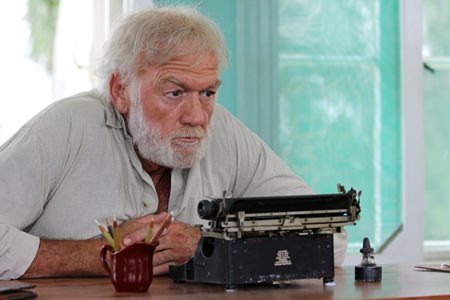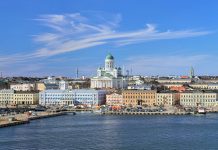Los Angeles (AP) – Ernest Hemingway left Cuba shortly after Fidel Castro’s revolution, as relations with the United States began to fall into a deep freeze. Over five decades later, the author of “The Old Man and the Sea” returns to the island thanks to the magic of the silver screen.
“Papa: Hemingway in Cuba” is the first full-length Hollywood feature filmed on the island since the 1959 Cuban Revolution, having wrapped even before Havana and Washington’s historic announcement that they would restore diplomatic ties.
 This image shows Adrian Sparks as Ernest Hemingway in a scene from the film, “Papa: Hemingway in Cuba”. (Yari Film Group via AP)
This image shows Adrian Sparks as Ernest Hemingway in a scene from the film, “Papa: Hemingway in Cuba”. (Yari Film Group via AP)
“Hemingway left as the doors were closing, and left his beloved home of many, many years to come back to the states and die 18 months later,” said Adrian Sparks, a veteran stage actor with a striking resemblance to the Nobel Prize-winning author he portrays in the movie, in a recent interview with The Associated Press. “Now Hemingway has come back to help open the doors again.”
“Papa,” as Hemingway was affectionately known, lived in Cuba from 1939 to 1960. He took his own life in Idaho in 1961, after having won the literary Nobel for classics such as “The Sun Also Rises,” ‘’A Farewell to Arms” and “For Whom the Bell Tolls.” He also won a Pulitzer for “The Old Man and the Sea,” which he penned in Cuba.
Directed by Bob Yari, “Papa” is a U.S.-Cuban-Canadian production based on an autobiographical script by Denne Bart Petitclerc, who died in 2006. The Petitclerc character in the movie is a young journalist called Ed Myers, played by Giovanni Ribisi, who befriends Hemingway in the late 1950s after sending the novelist a letter.
Through a series of visits to Havana, Myers bears witness to his hero’s greatness, his mutual love for Cuba and its people, and the afflictions that torment him.
“There’s been numerous films about Hemingway. This is the first one that deals with this time period of his life,” Sparks said. “It’s a very delicate time. It’s a powerful journey that the story makes and tries to understand who this man is.”
Joely Richardson, Minka Kelly and James Remar also star.
The film depicts a number of real-life Havana locations associated with Hemingway such as the El Floridita bar, where he was known to down prodigious quantities of lemony daiquiris, and the Ambos Mundos hotel, where he lived for a time. The 1950s cars that prowled Cuban streets then and still do today provide a period backdrop.
Filming took place over nine days in 2013 and again in April-May of 2014, Yari said. It was in December 2014 that Presidents Barack Obama and Raul Castro announced that the United States and Cuba would negotiate a historic thaw in relations.
Due to decades of bad geopolitical blood and the U.S. economic embargo, now 54 years old, previous Hollywood productions set in Cuba like “The Godfather: Part II” or 1990’s “Havana” were shot in stand-in locations, such as the Dominican Republic.
“Papa” is the first feature with a Hollywood cast and director to be shot on the island, although there have been other productions such as Wim Wenders’ 1999 documentary “Buena Vista Social Club.”
On the heels of “Papa” and the resumption of diplomatic ties, a number of U.S. productions such as “House of Lies” and the “Fast and Furious” franchise have already filmed there or sought permission to do so.
“I can’t tell you how thrilled I am to have been able to accomplish what we set out to do, which is kind of bridge a barrier between the two people of Cuba and the U.S.,” said Yari, who produced the Oscar-winning “Crash.” ‘’The arts, I think, are the biggest bridge to kind of overcome governmental issues.”
“The Cuban people and the American people really aren’t enemies, and they shouldn’t be enemies. Hopefully this film will help kind of heal that bridge, that gap that has been created between these two people,” he added.
The director said the biggest hurdle was getting Washington’s blessing to shoot in Cuba. “Papa” qualified as a docudrama since it’s based on real events, and California Sens. Dianne Feinstein and Barbara Boxer helped secure permission.
The $3 million production also had to do without backing from a bond company, a necessity for independent projects, since no company had any experience with Cuba, Yari added.
Cuban authorities gave the crew rare access to shoot inside Finca Vigia, Hemingway’s former home 10 miles southeast of Havana, now a museum where visitors are only allowed to gaze through the windows. The government also lent one of his old typewriters as a prop and approved the island’s official film institute to help with sets, wardrobe and local actors.
“One of my takeaways was really understanding well not only that Hemingway was loved in Cuba, but how much Hemingway loved Cuba,” said Sparks, who has also interpreted “Papa” in a play by John de Groot.




